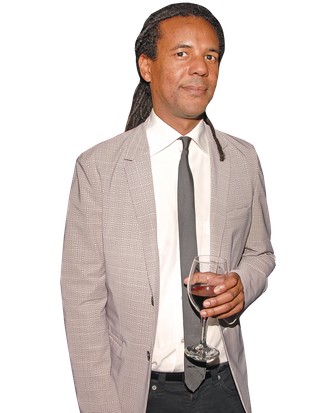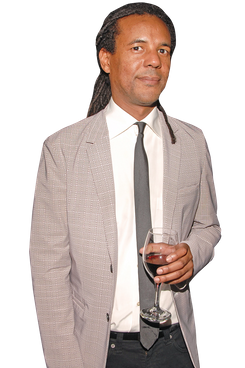

With a résumé that includes a Harvard degree, a MacArthur Fellowship, and five seriously well-received previous books, native New Yorker Colson Whitehead has now delivered a zombie novel? Yes, he has — although, being a Whitehead work, Zone One is not what you might expect. We spoke to the author and learned that he actually is a huge horror-movie fan, has very mixed feelings about Hollywood book options, and his vision of a crumbling city under siege was fed by his memories of Manhattan in the seventies. But back to those zombies
Did you time the release of Zone One so you’d be in the middle of zombie fever, what with The Walking Dead season two premiere and Comic-Con over the weekend?
I think my publisher was just glad to have it in time for Halloween. The glacial pace of putting out a book forbids that kind of planning, and I don’t think those sorts of things are on publisher timetables. They probably were only thinking in general, the horrific-ness of the month, people dressing up and going trick-or-treating or going on zombie walks. I thought the premiere was a good start, though — the first half-hour was very good. Once it had gotten into hunting for the kid, I was upset.
Your main character, Mark Spitz, grew up on monster movies and classic horror. And so did you?
Pretty much! The Twilight Zone, Outer Limits, Clive Barker, H.P. Lovecraft, all of that and whatever my brother and I could rent from Crazy Eddie: splatter movies, Hammer horror, Dario Argento, George Romero … anything with a societal breakdown. I’m glad to finally pay tribute to it all!
And I Am Legend? Even though that’s technically about vampires, it spawned the whole zombie apocalypse genre, including Night of the Living Dead. But there’s no actual mention of the word zombie in your book …
There’s no mention of zombie in Night of the Living Dead, either. There’s one reference in Dawn of the Dead. Each of these ravaged worlds has its own lexicon, so I was paying homage to that. The first treatment I saw of I Am Legend was the Omega Man version — Charlton Heston looked great in those seventies clothes, and those Afro vampires! The Will Smith version was good for the first hour, but for me, there’s just something more in that seventies version. That’s probably why I wrote this book. I grew up on films like that and I thought they were documentaries for a long time. I mean, if you grew up here in the seventies, the city was in terrible shape, so the idea of New York as this crumbling collection of edifices was a long-standing notion of mine.
Strange how we’re always seeing New York get destroyed in all these end-of-the-world scenarios.
Yeah, and now of course it evokes memories of 9/11. I still get a strange emotional charge out of Cloverfield, and even that moronic Day After Tomorrow movie. There’s just something about people running in the streets that flips the switch, where the city has changed, and it’s not home anymore, but monstrous terrain. That happens in Godzilla, Deep Impact, and that’s what ties into my idea of zombie terror. The kindly guy at the bodega is now a monster.
And the tourists, too. I had to laugh at your description of the zombies walking aimlessly through Central Park, and from overhead, looking like regular tourists!
Yeah, there’s a herd of zombies in Grand Central right now. I think there are times when we’re trapped in a mob for ten minutes that we feel like that. That’s where the fun in being a native New Yorker jerk comes to play.
Would you want Zone One to become a TV series or even a movie? If the focus weren’t just on the main three days?
The problem with movie options is that you say yes, and then you realize that whatever happened is not your vision. And most adaptations are terrible! It’s completely rare when they get it right. Although I might take the money and be happy. But usually not too many books with black people get adapted. Can you imagine a movie being made with a black female elevator inspector as the lead [as in his book The Intuitionist]?
Not if that’s your elevator pitch.
[Laughs.] Whoa. Put that in there. How many strong black female characters do you see as leads in the movies, say in the last ten years?
If you’re just counting this year, what about Viola Davis and Octavia Spencer in The Help? That’s getting Oscar buzz.
[Silence for a moment.] The Help. Think about it.
Okay, I see your point. But part of it isn’t just that they’re black, it’s also because they’re female. Not a lot of good parts for either.
So Hollywood is racist and sexist!
How do we change that?
We could get a slogan. Send out some leaflets. Go get some T-shirts made. That’s the first thing, if we’re going to get anything done. [Laughs.] The slogan could be, “Colson Whitehead has a mortgage, let’s stop this shortage.”
You don’t even mention your protagonist is black until near the end of the book. Why?
The idea is, if you’re in a freezer, stuck in a restaurant in a city overrun by zombies, what color the other people are — or whether they’re from Connecticut — doesn’t really matter. You’ve got bigger concerns on your mind, got to get the grill off the shaft so you can shimmy out and escape! Plus, I think given the conditions of the Western mind-set, people are going to assume he’s white. But the two sacred zombie texts — Night of the Living Dead and Dawn of the Dead — feature strong black protagonists.
Have you seen how there are now real-life zombie survival courses?
Where they have the gun ranges, and you shoot a zombie cutout instead of the black silhouette? Who would have thought it would come to that! I don’t think Romero ever imagined there would be zombie walks. I’m glad they’re out there, though. I don’t know what they’re thinking, but better to do a zombie walk than shoot up heroin! Give the kids something to do. [Laughs.]

